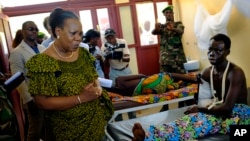This month marks the first anniversary at the helm of the Central African Republic for interim President Catherine Samba-Panza. Elected as sectarian violence raged across the country, she has a Herculean task: to end the civil war and put the country back on the right track.
She had pledged to bring peace and unity to her country. When Catherine Samba-Panza took the oath of office in January 2014, Central African Republic was in a dire state. The country had been torn apart by sectarian violence that left thousands of people dead and hundreds of thousands displaced.
Earlier this month, during a ceremony marking her first year in office, she recalled what was being said of the country by analysts at that time.
She said the International Crisis Group called CAR a phantom state... that it was not a even a fragile state anymore, but a phantom one, even a fictive one.
A year later, some improvement has been made, but a lot of challenges remain. Security has improved, notably thanks to the deployment of international forces. Yet the situation remains very fragile with regular outbreaks of violence.
Samba-Panza also admitted that the inter-community dialogue between anti-balakas and seleka groups has been difficult.
She said since the beginning of her government she has called to anti-balaka and seleka. She said she kept her "arms wide open" throughout the entire year, but now, her "arms are getting tired" as no one really respond.
The dialog has been made all the more difficult as the two armed groups fragment themselves into ever-smaller armed factions.
For Dieudonné Kpamo, historian at the university of Bangui, the transition government has been too weak to be heard and really make a difference.
He said that it was an understatement to say the government was weak. He said the country was in a period where there still was no real justice, with no tribunals or police force in place, and no prefects or mayors.
Samba-Panza also admitted that the Disarmament, Demobilization and Reintegration program (DDR) had not reached its goal and should be rethought. A lot of arms are still circulating in the CAR, fueling insecurity and banditry.
The transition period was meant to end in February 2015, but has been extended for six months in order to reach the objectives assigned. And the agenda is busy. Among the goals mentioned by the interim president: rebuilding the institutions, establishing a new constitution and meeting the deadlines for general elections, now planned for later this year.





